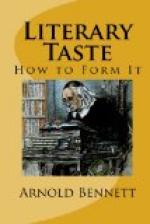If you are undecided upon a question of style, whether leaning to the favourable or to the unfavourable, the most prudent course is to forget that literary style exists. For, indeed, as style is understood by most people who have not analysed their impressions under the influence of literature, there is no such thing as literary style. You cannot divide literature into two elements and say: This is matter and that style. Further, the significance and the worth of literature are to be comprehended and assessed in the same way as the significance and the worth of any other phenomenon: by the exercise of common-sense. Common-sense will tell you that nobody, not even a genius, can be simultaneously vulgar and distinguished, or beautiful and ugly, or precise and vague, or tender and harsh. And common-sense will therefore tell you that to try to set up vital contradictions between matter and style is absurd. When there is a superficial contradiction, one of the two mutually-contradicting qualities is of far less importance than the other. If you refer literature to the standards of life, common-sense will at once decide which quality should count heaviest in your esteem. You will be in no danger of weighing a mere maladroitness of manner against a fine trait of character, or of letting a graceful deportment blind you to a fundamental vacuity. When in doubt, ignore style, and think of the matter as you would think of an individual.
CHAPTER VII
WRESTLING WITH AN AUTHOR
Having disposed, so far as is possible and necessary, of that formidable question of style, let us now return to Charles Lamb, whose essay on Dream Children was the originating cause of our inquiry into style. As we have made a beginning of Lamb, it will be well to make an end of him. In the preliminary stages of literary culture, nothing is more helpful, in the way of kindling an interest and keeping it well alight, than to specialise for a time on one author, and particularly on an author so frankly and curiously “human” as Lamb is. I do not mean that you should imprison yourself with Lamb’s complete works for three months, and read nothing else. I mean that you should regularly devote a proportion of your learned leisure to the study of Lamb until you are acquainted with all that is important in his work and about his work. (You may buy the complete works in prose and




